Lutein benefit
This page on lutein benefits explores the research proving that enjoying your greens, corn on the cob and Eggs Florentine will have a massive influence on reducing the risk of age-onset blindness. It is one of the many hundreds of phytonutrients in the carotenoid family; that's what gives them their bright colours.
What is unique is that lutein is selectively taken up by the retina and lens in the eye; and the brain.
Lutein is a xanthophyll; an oxygenated carotenoid that we are unable to synthesise and must get from our food. It really should be considered a vitamin. It's supremely needed in every diet.
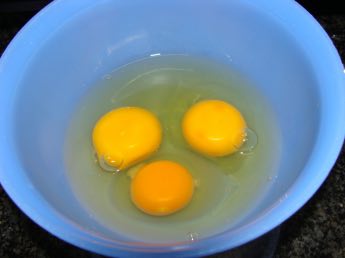 Which egg is free-range?
Which egg is free-range?This page was last updated by Bernard Preston on 9th January, 2025.
Incidentally can you tell which of these three eggs is free-range? We are having difficulty keeping our hens out of the kale; and fresh corn on the cob is their delight. It's all about the carotenes.
This page arose out of a consultation with my optician; after examining my eyes he remarked that I obviously ate plenty of dark-green leafy vegetables.
On inquiring how he could possibly know, the man replied there was absolutely no sign of macular-degeneration or cataracts which was unusual in someone approaching seventy. Five years later nothing has changed. Make sure you get enough lutein from your food.
Your greens
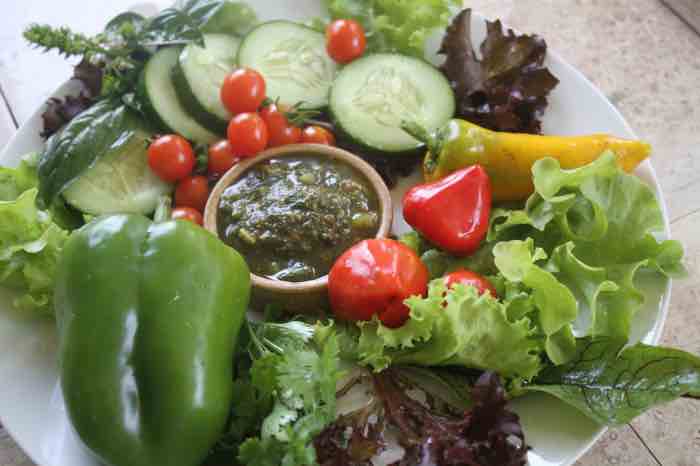 Garden salads and homemade pesto
Garden salads and homemade pestoHe was in fact correct; we often enjoy greens from our garden at all three meals. And so arose an interest in which phytonutrients protect the lens and retina against disease.
This urgency increased when two friends recently went blind in an eye immediately after what is today considered routine surgery for cataracts; and several others can only read with the use of a magnifying-glass because of macular degeneration.
And yet another is now almost completely blind; she smokes and abhors her greens. Both are hugely important factors in macular degeneration. These are of course simply anecdotes but there is a massive amount of research confirming that the carotenoids lutein and zeaxanthin are found in very high concentrations almost exclusively in the macula of the eye.
Zea means "from maize," and xanthin is the Greek for yellow; so corn and eggs being rich in this carotenoid both have an orange colour, the deeper the hue, the more of the phytochemical. The damaging blue light is absorbed protecting the macula.
Macular degeneration
Macular degeneration is largely a preventable disease; enjoying Eggs Florentine regularly is one way to ensure you are getting sufficient lutein benefit.
The macula is where the cones that give fine discrimination and detect colour are to be found.
Lutein and zeaxanthin have a yellowish or reddish colour, absorbing blue light; they give protection to the most sensitive areas of the eye against high-energy photons of radiation that enter.
Zeaxanthin and lutein benefits are thus simply vast considering that five million Americans are blind from age-related retinal disease; it's largely preventable.
Worse is that another ten-million are well on their way to using a white stick wherever they go.
Lutein benefit
Lutein benefit thus is of vital importance to each and every one of us[2]; together with zeaxanthin and L-dopa. Which food sources are richest in these three carotenoids?
Another of these carotenoids is lycopene which gives substantial protection to the prostate gland against a malignancy; it is in fact the most common fatal tumour of men. The treatment is severe leaving many impotent; and if it metastasizes to the bones of the pelvis and spine the disease is severely painful.
So shall we look at the research to find out which foods are richest in lycopene too?
A friend calls me a food snob; it's an interesting statement. When does a determination not to suffer from preventable diseases disintegrate into what is known as Orthorexia Nervosa? It is a psychological illness characterised by a refusal to eat out because the menu may possibly contain certain additives that one considers rightly or wrongly, toxic.
It is a fine line that distinguishes between a food snob, the health nut and orthorexia. If you find yourself taking your own fare to a host's home because of a fear of what they might feed you then it is time to beware; you are teetering on the edge.
For its lutein benefit alone one simply must eat dark-green leafy vegetables. The thought of needlessly going blind is a powerful reminder of the old adage, prevention always will remain better than a cure.
Enjoy your food
For me Bernard Preston, a food snob if you like there are two important issues here. Keeping them in balance can be difficult; but the tongue can be trained.
The first is the sheer enjoyment of our food; thus I detest counting calories, weighing my portions and fussing about how many colours I've consumed today. All three would destroy the pleasure of eating; I refuse to do it.
The second is that I don't like being sick, I hate swallowing pills and abhor consulting doctors; is that so unusual? Thus, if I have to adapt my taste and train my tongue, so be it I will discipline myself and do it.
A recent example is a life-long indifference to broad beans; perhaps the first and only time I had them they were old or was my tongue just untrained? They tasted awful.
There happens to be a very high incidence of Parkinson's disease in our area; in fact it is fastest growing neurological disease in the whole world. On discovering that they have a very high level of naturally occurring L-Dopa it did not take long for me to find out how to plant broad beans. Now I find to my surprise that straight from the garden they are perfectly delicious.
They also have the highest level of plant protein of all legumes except soybeans incidentally.
Source
Avocado
Kale
Egg yolk
Corn
Red grapes
Zucchini
Pumpkin
Spinach
Orange pepper
Pea
Green pepper
Butternut
OJ #
Honeydew
Spring onion
Green bean
Broccoli
Apple red
Lettuce green
Red pepper
Tomato
Lutein
136 mixed
70*
54
60
43
47
49
47
8
41
36
37
15
17
27
22
22
19
15
7
6
Zeaxanthin
136 mixed
70*
35
25
10
5
0
0
37
0
3
0
20
18
3
3
0
1
0
0
0
Lycopene
High
0
0
0
5
0
0
0
0
0
0
0
4
4
0
0
0
13
8
8
82
These figures are taken from the British Journal of Ophthalmology[4].
* Kale is the richest source of lutein and zeaxanthin but I'm still looking for the correct split. Provisionally I have divided them 50/50 but that is not established fact.
# Notice that freshly-squeezed OJ is high in many nutrients. Alas its distant cousin from a carton is a pale shadow of the real thing; in my humble opinion a highly glycemic junk food.
Glaucoma
The Glaucoma Foundation also recommends foods rich in lutein, by the way.
Eggs Florentine
Eggs Florentine is one excellent way to make sure you are getting enough lutein benefit and zeaxanthin too; both spinach and eggs are rich sources of these vital carotenes.
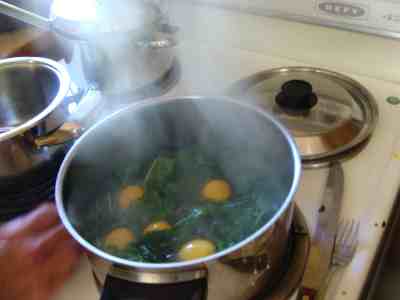
Eggs Florentine is a very quick way to make a nutritious breakfast; even our grandchildren love it. Prepare it the way you particularly like it; so toss in a half a tomato perhaps for the lycopene and garlic for the allicin benefits. Other greens like a few snippets of scallions or fresh peas simply add to the dish.
The bioavailability of zeaxanthin and lutein benefits is limited unless the spinach or kale is chopped up, well-chewed and perhaps cooked; and the use of a fat like butter or olive oil to enhance absorption.
Interesting research shows that chewing our food thoroughly also helps delay the onset of dementia; perhaps it's the increase of these carotenes.
Of interest is that researchers have shown that although kale and spinach have greater concentrations of lutein and zeaxanthin than eggs, the fat-content of the latter makes them a better source of these carotenoids due to the increased bioavailability.
There are many reasons why limiting fat in our food is not a good idea if trying to lose weight; this is just one of them. It's the refined carbohydrates in any case that make us obese; rather look to these ketogenic diets.
In an interesting experiment reported in the Journal of Nutritional-Science[1] researchers compared the carotenoids in the eggs of hens fed a normal free range diet to that fortified with different formulations. It makes interesting reading about enhancing the benefit of obtaining carotenoids from our food versus supplements.
Enjoy more recipes for cooking kale; dicky it up with some herbs and spices and perhaps a little fatty-fish to help with absorption of the lutein and give it an interesting different flavour.
This kale pesto will make any boring salad a lot more interesting; in addition it has pecan-nuts, feta cheese and lemon pulp.
Add a finely-chopped broad bean to your Eggs Florentine. Dopamine has a profound influence on the function and health of the eye.
Cognitive well-being
In two remarkable studies at Tufts university researchers found that both those taking supplementary lutein and folk enjoying an avocado a day, a good source had higher levels of the phytonutrient in the eye and the brain; and demonstrated improved problem-solving and other cognitive functions.
Two cups of packed spinach also contains 10 mg of lutein, considered sufficient. The average person eating typical grocery store food is getting only a fifth of that carotenoid per day. It should not be necessary to take supplements of a nutrient so freely available in our food; but dark-green leafy vegetables are not very popular.
Corn
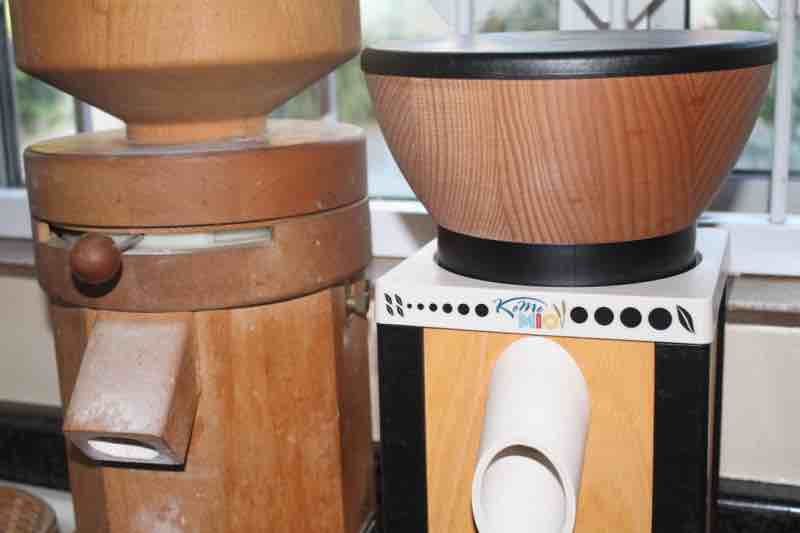 100% flour and cornmeal
100% flour and cornmealSo determined are we to get the full benefit of the lutein and zeaxanthin in maize that we have bought a new stone mill; to go with our faithful old Hawo that has provided us with 100% wholemeal flour for over twenty-five years.
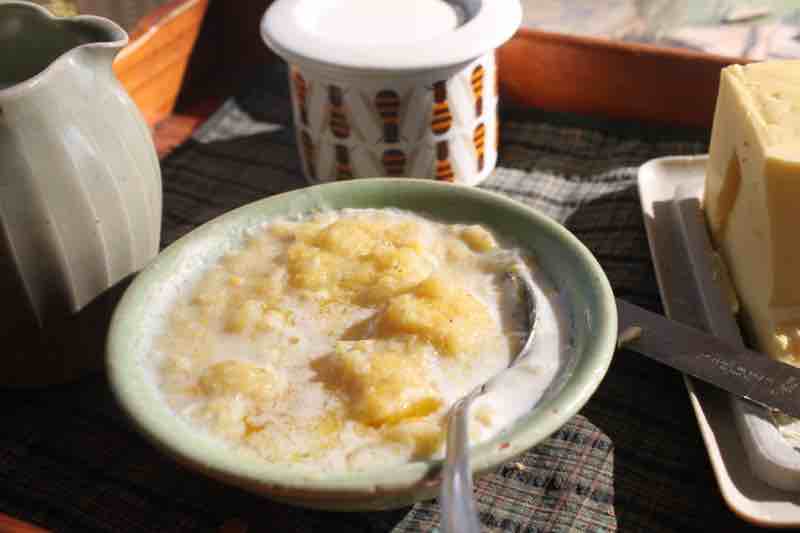
Apart from the lutein and many other benefits of 100% whole grain, this porridge[3] with a little natural honey and cream is simply out of this world. Why on earth would you want cornflakes at literally 28 times the price? Most of the carotenes have been extracted.
Clever food manufacturers extract all the best parts for pig food, then "enrich" it with a few synthetic vitamins and minerals; and laugh all the way to the bank. We've been duped.
Homemade cornbread using 100% meal is another favourite.
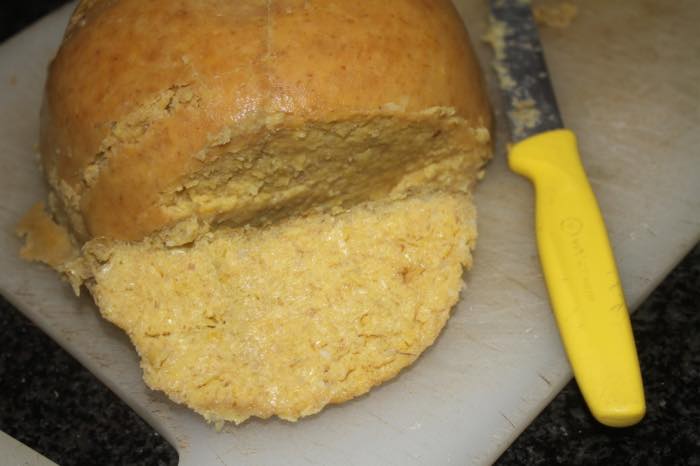
Eye exercises
Lutein benefit is not enough to prevent myopia which is increasing alarmingly; and predicted to affect 5 billion people by 2050. It is associated with a heap of serious eye diseases.
Three simple eye exercises are recommended.
1. The 20 minute rule
Every 20 minutes tear you eyes away from the screen and focus on an object twenty feet away.
Focus on the object for 20 seconds.
2. The blink exercise
Rapidly blink your eyes ten times, followed by closing them for 20 seconds.
3. Spend more time out of doors
Simply spending more time out of doors enables the muscles of the eyes to relax; especially in bright light causing the pupils to constrict. This is particularly important for children.
Myopia dramatically raises the prevalence of blindness from macular degeneration, cataracts and glaucoma.
General recommendations to prevent myopia
- Take a break every 30 minutes when doing "near work."
- Keep a proper distance when reading a book.
- Sufficient light when reading is important.
- Limit the time when watching TV.
- Spending time out of doors stimulates the release of dopamine from the retina; that inhibits further axial elongation of the eye[5].
- Eating broad beans which are rich in L-dopa, the precursor of the neurotransmitter.
Bernard Preston
Bernard Preston is very conscious of what he calls the food snob neurosis; it's a serious psychological illness in which we become so consumed with what we are eating that we refuse to enjoy what others have prepared. The lutein benefit is important but not to the extent that we go crazy.
We all need to be aware that what started out as a passion for clean-living doesn't end up making us extremely antisocial and neurotic; it can and does happen. When we begin to worry about what lutein benefits there are in a particular meal, this or that, then danger lurks.
Having said that I will never drink colas, eat white bread or margarine; and try to avoid fast-food where possible. It's delicious whole grains, fresh green salads and experimenting with condiments like parsley pesto that fascinate me.
Bernard Preston is the author of three books on manipulation, a trilogy and is busy with a fifth provisionally called Priests Denied.
When browsing use right click and Open Link in New Tab; or you may get a bad gateway signal.
The material expressed on this page is gleaned from the nutritional and environmental literature; it is clearly referenced. A plain distinction is made between the author's opinion and that which is scientifically proven. When in doubt consult your health professional.
To suggest a correction or clarification, write to Dr Bernard Preston here. Contact.
From the horse's mouth
Newsletter
Our newsletter is entitled "create a cyan zone" at your home, preserving both yourself and Mother Earth for future generations; and the family too, of course. We promise not to spam you with daily emails promoting various products. You may get an occasional nudge to buy one of my books.
Here are the back issues.
- Lifestyle and ideal body weight
- What are ultra-processed foods?
- Investing in long-term health
- Diseases from plastic exposure
- Intensive lifestyle management for obesity has limited value
- A world largely devoid of Parkinson's Disease
- The impact of friendly bacteria in the tum on the prevention of cancer
- There's a hole in the bucket
- Everyone is talking about weight loss drugs
- Pull the sweet tooth
- If you suffer from heartburn plant a susu
- Refined maize meal and stunting
- Should agriculture and industry get priority for water and electricity?
- Nature is calling
- Mill your own flour
- Bake your own sourdough bread
- Microplastics from our water
- Alternative types of water storage
- Wear your clothes out
- Comfort foods
- Create a bee-friendly environment
- Go to bed slightly hungry
- Keep bees
- Blue zone folk are religious
- Reduce plastic waste
- Family is important
- What can go in compost?
- Grow broad beans for longevity
- Harvest and store sunshine
- Blue zone exercise
- Harvest and store your rainwater
- Create a cyan zone at your home
Did you find this page interesting? How about forwarding it to a friendly book or food junkie? Better still, a social media tick would help.
Address:
56 Groenekloof Rd,
Hilton, KZN
South Africa
Website:
https://www.bernard-preston.com